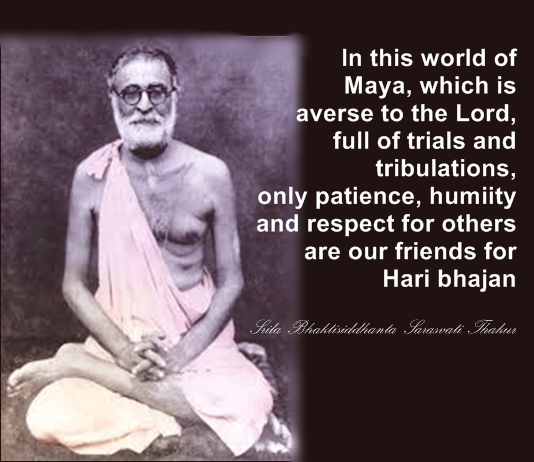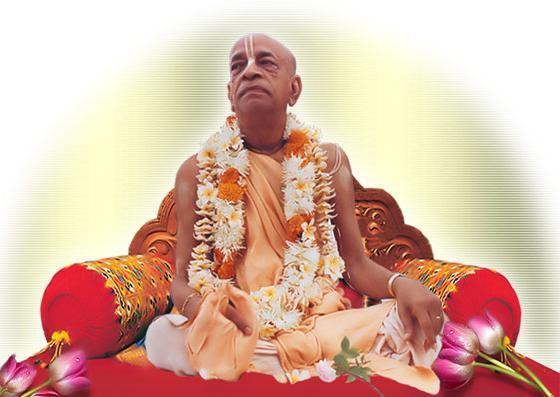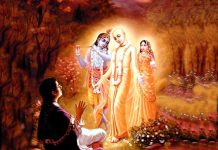 Srila Bhakatisiddhanta Sarasvati Thakur, hailed as the Lion Guru by those who know his strikingly bold presentation of Vedic philosophy, especially the teachings of Lord Chaitanya, and his equally awe-inspiring personality, has made some compelling statements establishing why a person accepting the responsibility of a guru, or spiritual master, must not shy away from accepting praise, respect, or even worship. At the same time, he has unreservedly blasted those bogus gurus who expect, accept, and even demand such honour without having qualification of a guru and without following their other duties.
Srila Bhakatisiddhanta Sarasvati Thakur, hailed as the Lion Guru by those who know his strikingly bold presentation of Vedic philosophy, especially the teachings of Lord Chaitanya, and his equally awe-inspiring personality, has made some compelling statements establishing why a person accepting the responsibility of a guru, or spiritual master, must not shy away from accepting praise, respect, or even worship. At the same time, he has unreservedly blasted those bogus gurus who expect, accept, and even demand such honour without having qualification of a guru and without following their other duties.
It is widely understood that a saintly person is humble; he does not expect respect from others but gives respect to them. This is true and Lord Chaitanya has categorically instructed His disciples to follow this principle. However, a guru is not just a saintly person; he represents God, the Supreme Personality, and as such, he has certain obligations to fulfill.
In modern days, when people in general do not know the finer principles of Vedic scripture, it is difficult for a guru to take a high seat and accept worship from others as such actions can attract negative criticism. It may also happen that a guru feels uncomfortable accepting honour or sees himself unqualified to do so. The question is, is it wrong for a guru to avoid or refuse receiving honor? Is it humility in the eyes of Vedic scripture if a guru does not want to be honored?
According to Srila Bhaktisiddhanta Sarasvati Thakur, a person who accepts the grave responsibility of being a guru must accept honor. No matter how humble a person may feel of himself and no matter how much criticism is hurled at him, once he accepts the responsibility of being a guru, it becomes his sacred duty to not only give transcendental knowledge to disciples but also accept respect and worship from them, for by doing so he does not only glorify his guru and the entire guru parampara but also helps the disciples receive mercy of the Lord.
This is one of the most essential aspects of following the guru parampara. The last two lines of Srila Vishvanath Chakravarty Thakur’s guruvastakam prayers emphasize this fact.
sakshad-dharitvena samasta-shastrair uktas tatha bhavyata eva sadbhihi
kintu prabhor yah priya eva tasya vande guroh sri-charanaravindam
TRANSLATION: The spiritual master is to be honored as much as the Supreme Lord, because he is the most confidential servitor of the Lord. This is acknowledged in all revealed scriptures and followed by all authorities. Therefore I offer my respectful obeisances unto the lotus feet of such a spiritual master, who is a bona fide representative of Sri Hari [Krishna].
yasya prasadad bhagavat-prasado yasyaprasadan na gatih kuto ‘pi
dhyayan stuvams tasya yashas trisandhyam vande guroh sri-charanaravindam
TRANSLATION: By the mercy of the spiritual master one receives the benediction of Krishna. Without the grace of the spiritual master, one cannot make any advancement. Therefore, I should always remember and praise the spiritual master. At least three times a day I should offer my respectful obeisances unto the lotus feet of my spiritual master.

Just like a foreign ambassador representing his country is duty bound to accept the honour offered to him by the state government, a guru, who is a pure representative of his guru and of the Supreme Lord, is duty bound to accept all honour and praise showered on him. A humble guru knows well that the respect offered to him does not belong to him but to his spiritual master. This is why he accepts it and passes it on taking the risk of being criticized by those unaware of the science of Krishna consciousness. This is true humility, loyalty and detachment.
Not only gurus, even other saintly persons are also offered respect in a civilized society. If such respect is accepted on behalf of one’s spiritual master, or on behalf of the Lord, it is considered humility. In previous ages saintly persons used to move around from one place to another in order to distribute mercy of the Lord and people, by serving such saintly persons, would get spiritual merits. But such saintly persons are not bound to accept honor so far they don’t accept the position of a spiritual master.
It goes without saying that the principle of guru worship must not be misused for personal sense gratification as the tendency to use Vedic injunctions for selfish purpose is condemned by all the great preceptors of Vedic philosophy. Those who harbor desires to gain name and fame by being a guru are strongly advised not to venture into accepting that responsibility prematurely.
Recently we came across a brilliant piece of writing in this regard by Srila Bhaktisiddhanta Sarasvati Thakur and thought of sharing it with our readers. The depth of his dedication to the Sankirtan movement, the yuga dharma for this age, and his unwavering determination to spread the teachings of Lord Chaitanya in its purest form is easily realized from his words. We can also understand from his statements the fierce opposition he faced from cheap gurus and so-called saintly people of that time who had no clue of the duties of a bona fide guru, and how he crushed their false propaganda.
“”We have taken upon ourselves the responsibility of welcoming this grave charge. All the audience have accepted ordinary seats, I alone have been provided with a lofty seat. All are being told in effect – “Do have a look at a big animal from the Zoo-gardens. What arrogance! So foolish! So wicked! Have you ever seen such a big brute? Garlands of flowers have been put round his neck! What laudations! What bombastic long-drawn, and hyperbolic adjectives! And how complacently too he is listening to the praise of his own achievements, how intently, and with his own ears! He also evidently feels delighted in mind! Is he not acting in plain violation of the teaching of Mahaprabhu? Can such a big brute, so selfish and insolent, be ever reclaimed from brutishness?”
I happen to be one of the greatest of fools. No one offers me good advice on account of my arrogance. Inasmuch as nobody condescends to instruct me I placed my case before Mahaprabhu Himself. The thought occurred to me that I would make over the charge of myself to Him and see what He would advise me to do. Then Shri Chaitanyadeva said to me: “Whom-so-ever thou meet’st, instruct him regarding Krishna, By My command being Guru deliver this land; in this thou wilt not be obstructed by the current of the world; Thou wilt have My company once again at this place.”
In these verses is to be found the proper explanation of the apparent inconsistency noticed above. He whose only teaching is humility greater than that of a blade of grass, said- “By My command being Guru save this land!” – In this instance Mahaprabhu Himself has given the command. His command being “Perform the duty of the Guru, even as I do it Myself. Also convey this command to whom-so-ever you chance to meet.” Chaitanya deva says, “Tell them these very words, viz. By My command being Guru save this land Deliver the people from their foolishness.”
Now, who-so-ever happens to hear these words would naturally protest with palms joined – “But I am really a great sinner, how can I be Guru? You are Godhead Himself, the Teacher of the world. You can be Guru.” To this Mahaprabhu replies: “Do not practice the craft of a Guru for the purpose of injuring others through malice. Do not adopt the trade of a Guru in order to get immersed in the slough of this world. But if you can, indeed, be My guileless servant you will be endowed with My power–then you need not fear.
I have no fear. My Gurudeva has heard this from his Gurudeva. And it is for this reason that my Gurudeva has accepted even such a great sinner as myself and has told me. “By My command being Guru save this land.” It is only those who have never heard these words of Gaursundar who say “How odd! to listen to one’s own praise!” While the Guru is instructing his disciple in the eleventh Skandha of the Bhagavatam what a great sin, in their opinion, is he not perpetuating! What is the Acharya to do when he has to explain the Shloka Acharya Mam Vijaniyat: “Never disregard the Acharya; never entertain the idea that the Acharya is your equal in any sense.” These are the words of Shri Krishna Himself by which the jiva is to be benefited.
Is the Guru to take himself off, to desert his seat–the seat of the Acharya–from which these words are to be explained? That office his Gurudeva has conferred on him. If he does not act up to its requirements he is doomed to perdition by reason of his offense against the holy Name in the shape of disrespect towards the Guru. He has to do it in spite of the fact that such procedure is apparently open to the charge of egoism.
When the Guru imparts the mantram to the disciple should he not tell him by this mantram to worship the Guru? Should he say instead, “Give the Guru a few strokes of the shoe or the horse-whip?” The Guru is never to be decried. The Guru is the abode of all the gods. Should the Gurudeva abstain from communicating these words to his disciple while reading the Bhagavatam to him? “To him alone who possesses guileless spiritual devotion, similar to the transcendental devotion that is due to Krishna Himself, to the Gurudev, the holy mysteries are manifested.” Is the Gurudeva not to tell these things to his disciples? “Athau Gurupuja: the worship of the Guru has precedence over all others.”
The Guru is to be served just as Krishna is served. The Guru is to be worshiped in a particular way. Is the Guru to desert his seat without telling all these things to the disciple? In the angle there is always the defect in the shape of absence of the fullness, the evenness of level, of 180 degrees or of 360 degrees. But in the plain surface, in 360 degrees, there is no such defect. That in the emancipated state no defect is possible, this simple truth ordinary foolish people entirely fail to grasp.
As the saying goes, “having started on the dance it is no use to draw close the veil.” I am doing the duty of the Guru, but if I preach that no one should shout “Jai” to me, that is to say, if I say in a round about way, “sing Jai to me,” it would be nothing short of duplicity. Our Gurudeva has not taught us such insincerity. Mahaprabhu has not taught such insincerity. I have to serve God in the straightforward way. The word of God has come down to the Gurudeva; I have to obey it in all sincerity. I will not disrespect the Guru at the instance of any foolish or malicious sectarians. Especially as Sri Gurudeva has directed me saying, “By My command being Guru save this land.” This command has my Gurudeva preached.
My Gurudeva in his turn has conveyed the command to me. I will not be guilty of any insincerity in carrying out that command. In this matter I will not accept the ideal of ignorant, insincere, pseudo-ascetic sectarianism. I will not learn insincerity. The worldly-minded, the malicious, the pseudo- renunciationists, the selfish cannot understand how the devotees of God, spurning at everything of this world by command of God, never, not even for a second, deviate from the service of God through all the twenty-four hours.
Hypocritical sectarians, pseudo-Vaishnava sects, those sects that cherish internally the longing for earthly fame, naturally enough think “what a shame it is for one to listen to the eulogies of disciples occupying the seat of the Guru.” But every Vaishnava regards everyone of the Vaishnavas as the object of his veneration.
When Thakur Haridas exhibits the attitude of humility Mahaprabhu says – “You are the greatest of the world, the crestjewel of the world. Be agreeable, let us have our meal together.” He carried in His arms the body of Thakur Haridas which is eternally existent, self-conscious and full of spiritual bliss.
In the community that follows Srila Rupa, the qualities of desiring no honor for oneself and of readiness to duly honor others are fully present. Those who detect any disparity are, like the owl, blind while the sun shines. They commit an offense by such conduct.
If I disobey the law which has come down to me through the chain of preceptorial succession, the offense due to omission to carry out the command of the Guru will sever me from the lotus-feet of Sri Gurudeva. If in order to carry out the command of the Vaishnava Guru I have to be arrogant, to be brutish, to suffer eternal perdition, I am prepared to welcome such eternal damnation and even sign a pact to that effect.
I will not listen to the words of other malicious persons in lieu of the command of the Gurudeva. I will dissipate with indomitable courage and conviction the currents of thought of all the rest of the world, relying on the strength derived from the lotus feet of Shri Gurudeva. I confess to this arrogance. By sprinkling a particle of the pollen of the lotus-feet of my Preceptor crores of people like you will be saved. There is no such learning in this world, no such sound reasoning in all the fourteen worlds, in no man-gods, that can weigh more than a solitary particle of the dust of the lotus-feet of my Gurudeva. Gurudeva in whom I have implicit trust can never spite me. I am by no means prepared to listen to the words of any one who wants to hurt me or to accept such a malicious person as my preceptor.”” (http://gosai.com/writings/assuming-responsibility-of-being-guru)



































